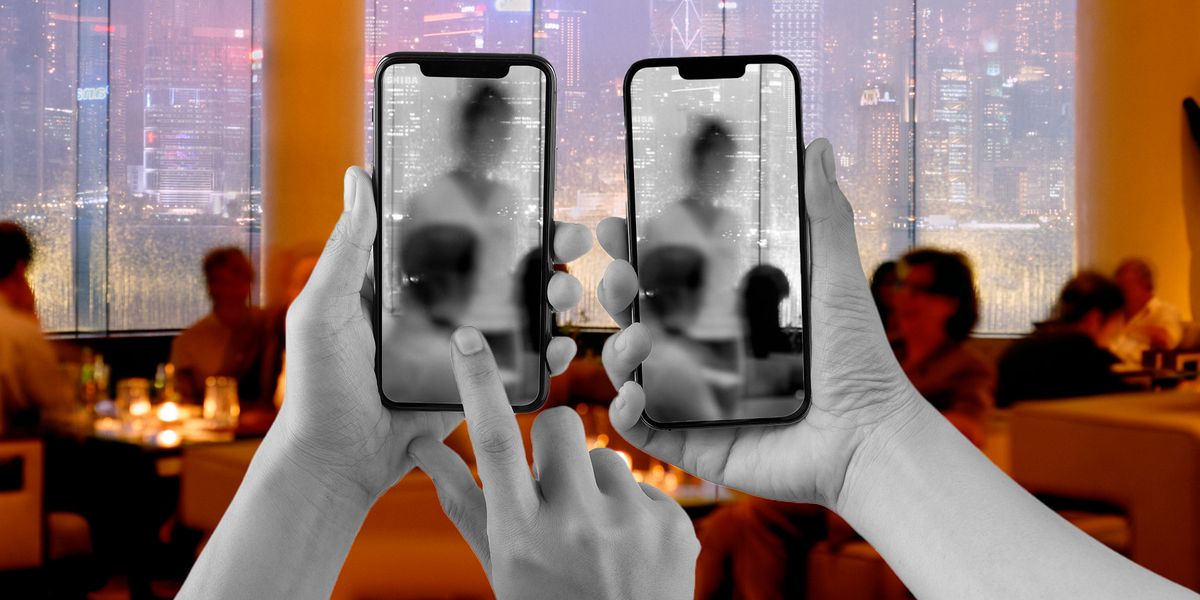
WOULD WE BE HAPPIER IF MORE RESTAURANTS BANNED PHONES?
There once was a time when “the phone eats first” wasn’t a thing people said. We weren’t distracted by their dings and illuminated screens at dinner. We were never momentarily blinded by a flashing iPhone camera from the table next to us.
Phones have infiltrated every part of our lives, from the gym to the bathroom to the crowded dining table, taking up space that could otherwise be occupied by more wine or fries. And now, some restaurants are banning phones altogether.
Guests at Al Condominio in Verona, Italy, can get a free bottle of wine for locking away their phone during the meal. Diners at Caterina’s in Fort Worth, Texas, have to put their phone in a bag. Frog Club, which calls itself “The New Yorkiest Room in New York,” makes you put a sticker over your phone camera, probably not as much to prevent people from posting photos of their food, but to fuel the restaurant's exclusive image. New York’s Il Triangolo is no longer open, but it also banned phones.
Cell phones are dirtier than toilet seats; one in six phones sampled in the U.K. contained fecal matter. Putting them so close to your food is pretty unsanitary. While this should be reason enough to ban them from dining rooms, it isn’t why restaurants are doing it.
The owners of Al Condominio wanted to encourage diners to talk to each other. Mario Gigliotti, owner of Il Triangolo, told Forbes that he banned cell phones in 2014 after growing irritated by how they distracted customers during dinner and slowed down service. While only a handful of customers had opted to dine somewhere else because of the rule, Gigliotti said that he had a lot of regular repeat business.
There’s no denying that phones can be distracting, but using a phone at the table could even cause you to eat more calories, according to research published in Frontiers in Psychology. A study from 2018 found that using a smartphone while dining makes the experience less pleasant than it might otherwise be. “They can take away or prevent us from reaping the full benefits of these positive activities,” said Dr. Kostadin Kushlev, assistant professor at Georgetown University and co-author of the study.
In the 2010s, chef Marco Canora began noticing the proliferation of cell phone use in his Manhattan restaurant Hearth. “To see a couple sitting at a table around dinner with their heads embedded in their phones, it was just so devastating to me,” he said. Around 2016, he placed a cigar box on each dining table with the words “open me” on top. Inside was a note inviting customers to “unplug” by putting their phones in the box. Canora says that over half of all parties at Hearth choose to use the boxes—about six or seven out of every ten tables.
“It’s a conversation starter for sure,” Canora said.
Some restaurants, meanwhile, are begging you to use your phone at the table. With the amount of spots blowing up on TikTok and Instagram, there’s no doubt that customers’ videos and photos lead to free advertising. Some restaurants have created a spectacle with Instagrammable cocktails, dishes, and neon signs, encouraging customers to capture content and share on social media.
While Canora considered the positive aspects of user-generated content, he was optimistic about the cigar boxes.
“I was happy to make that trade-off if it meant human connection because I believe in it and I believe in the value of it and that dining is the most convivial thing we can do,” he said.
Of course, customers can still take photos of pasta at Hearth; the boxes aren’t mandatory or locked. They’re more of a subtle reminder that your phone isn’t a guest in the reservation.
Putting the phone away can be difficult if our restaurant experience relies on using it. Post-Covid, many restaurants still have QR codes and online-only menus, which require customers to have a phone. Many casual restaurants even encourage mobile ordering over talking to a server, which Dr. Kushlev said can turn restaurants into “dead zones.”
While light conversation and greetings from a server might seem like a small thing, Dr. Kushlev said that these interactions actually contribute to our overall happiness at a restaurant. “Those small little bonds that basically hold society together [are] about these very small social interactions with strangers, and one of those places that happens is at restaurants,” he said.
Phone policies or incentives at restaurants aren't necessarily new, with those at Il Triangolo and Hearth having been in place for years, but perhaps their longevity is a testament to how much they're needed. If we're asked to stop and put the phone away, we begin to realize how integral the mini computers have become and how bothersome they can be, especially at the table.
When I think of my favorite meals, I remember them vividly. There is no photographic evidence other than perhaps a quick snap of the people I’m sharing the meal with. I can recall the conversation, the natural silences, the taste of the food, the glasses of wine. They were the meals when after one, two, three hours passed, I felt stuck in time because I hadn't looked at my phone. The food tasted better, and I was happier.
2024-05-09T21:36:35Z dg43tfdfdgfd